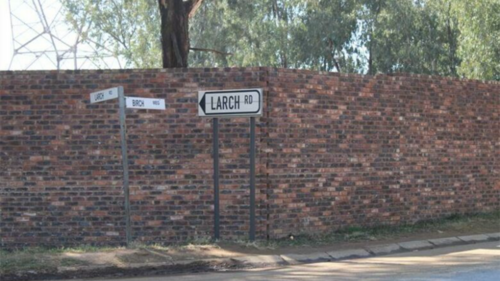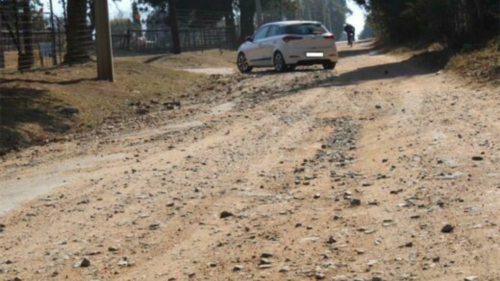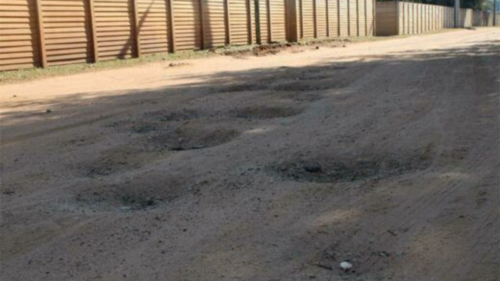News
Absence of Swift Strategy for Enhancing Agricultural Roads

For four decades, the residents of Larch Road in Petit have witnessed a disheartening saga as their once-functional road has devolved into a landscape marred by countless potholes. This ongoing predicament has left the community grappling with the consequences of inadequate road maintenance and deteriorating infrastructure.
Also Read: 14-Year-Old South African to Shine Globally
Speaking on behalf of many, an anonymous resident shed light on the daily battle faced by motorists who navigate this treacherous stretch of road. A labyrinth of craters has transformed routine journeys into a harrowing ordeal, pushing drivers to make split-second decisions between equally daunting potholes. With mounting frustration, the resident lamented, “Navigating this road has become an absolute nightmare.”
The dire state of Larch Road has gone beyond inconvenience, extending its impact to vehicular damages and the unfortunate incidents of vehicles becoming immobilised. As the rainy season looms, apprehension takes root, with the fear that the road’s condition could degrade to a point where it becomes unusable altogether.
Zweli Dlamini, the spokesperson for the City of Ekurhuleni, acknowledged the plight of Larch Road within the larger context of the Benoni Agricultural Holdings. This road, stretching over 2.44km, is part of a network of 36.75km of dirt roads. Despite witnessing higher traffic volumes, these roads have yet to receive the resources necessary for transformation.

Photo: Supplied by Benoni City Times
Dlamini conceded the absence of budgetary allocations aimed at “formalising” these dirt roads, a term indicating a transition from their current state to a more durable and navigable condition. He elucidated the financial constraints that underpin the city’s inability to address this issue. The significant price tag, estimated at R10 million for a mere 1km stretch, has thwarted any immediate plans for the roads’ overhaul.
A more profound challenge surfaces when considering the intricacies of upgrading dirt roads. Dlamini articulated the necessity of preliminary groundwork involving leveling and the creation of trenches for stormwater drainage systems. Neglecting these crucial preparatory steps could result in the undesirable consequence of road collapse and the formation of potholes, thus exacerbating the very issue it seeks to resolve.
Residents, however, offer a contrasting perspective that challenges the official narrative. Dissenting voices assert that Larch Road has remained largely untouched, defying claims of periodic attention. The anonymous resident refuted the idea of road maintenance, stating, “I cannot recall a single instance that I have seen a grader on this road, let alone city employees filling a hole.” Despite their valiant efforts to mitigate the damage, their endeavours prove short-lived as the road surface succumbs to further erosion, particularly pronounced during summer when cascading sand compounds the challenge.
Amidst this backdrop, residents question the apparent dissonance in prioritisation. Their frustration finds voice in the example of Gum Road, a recently tarred road, thus receiving a transformation that eluded Larch Road. The contradiction between the fate of these two roads amplifies the residents’ perplexity as they seek to understand the selective allocation of resources.

Photo: Supplied by Benoni City Times
Dlamini underscored the formalisation process, emphasising its integration into the Integrated Development Plan (IDP), a comprehensive strategy for local development. This process involves consultation with elected ward councillors and their respective committees to assess the issue’s priority status. The criteria span various factors, including the road’s significance as a major route, adherence to road specifications, and budget allocation.
The struggle of Larch Road paints a complex picture of resource allocation, bureaucratic processes, and the tangible impacts on a community forced to grapple with deteriorating infrastructure. The battle for road rehabilitation extends beyond the physical conditions to encompass the intricate balance of priorities, financial constraints, and the long-term vision for an improved urban landscape.
Source: No speedy plan to upgrade agricultural roads
Also Read:
Thousands of Litres of Water Lost in Ongoing Leak in Alberton North
Follow us on Google News
Photo: Supplied by Benoni City Times






















